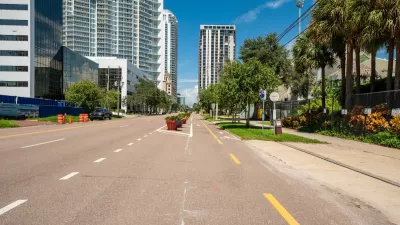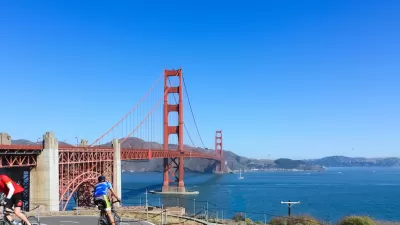Sometime in the last year – when the smart people in North America weren't looking – bike-sharing turned into a billion-dollar industry. I may be exaggerating when I say “industry.” But not “billion.”
Sometime in the last year – when the smart people in North America weren't looking – bike-sharing turned into a billion-dollar industry.
I may be exaggerating when I say "industry." But not "billion."
"Banks and private equity firms are eyeing a growth market for the bike industry," reports Bike Europe. "The money involved in such systems is huge. In return for the Paris Vélib system with its 1,451 rental stations and 20,600 bikes, JCDecaux obtained the rights to exploit 1,628 billboards in Paris. The company expects to realize € 600 million in advertisement turnover over the course of the 10-year contract." Cities all over the world are now looking seriously at public bike systems: London, Geneva, Barcelona, Rome, Beijing, Sydney.
About a decade ago, Vancouver contracted with JCDecaux to manage our bus shelters and street furniture in return for advertising rights on the shelters. Like most cities, we already allowed billboards to proliferate with zilch in the way of public contribution, and so can't lever them to finance a Velib-type system.
We're in danger of missing out as other cities take advantage of this new green economy. Columnist Thomas Friedman has been making this point repeatedly in the New York Times: "Being green, focusing the nation on greater energy efficiency and conservation, is not some girlie-man issue. It is actually the most tough-minded, geostrategic, pro-growth and patriotic thing we can do ." Climate change and the rising cost of crude are going to make green technologies the industries of the 21st century, and we're not yet taking them seriously.
And why? As Friedman says of our current leaders: "when it comes to making ourselves energy efficient and independent, and environmentally green - they ridicule it as something only liberals, tree-huggers and sissies believe is possible or necessary." Real men don't ride bikes.
This summer, a social policy analyst with the Netherlands government came to Portland, Oregon and Vancouver, B.C. to see what the Dutch might learn from us. (Yes, from us!) And what he discovered was the irony of our political culture: "Cycling in North America is clearly a leftist thing," reported Loek Hesemans, "although it ties in with conservative North American values like independence, freedom and the ability to manage for oneself." (You can read a lot more of Loek's observations in the current issue of Price Tags.)
And so common-sense activities that shouldn't be ideological are given a left/right slant and used to fight another battle in the culture wars. We end up blinding ourselves to opportunity – in the case of bike sharing, one that makes money while reducing greenhouse gases, that helps free us from oil shocks and car dependency, and pioneers a way of life that makes people in other places healthier, happier and richer, as we become vulnerable, fatter and poorer.

Alabama: Trump Terminates Settlements for Black Communities Harmed By Raw Sewage
Trump deemed the landmark civil rights agreement “illegal DEI and environmental justice policy.”

Planetizen Federal Action Tracker
A weekly monitor of how Trump’s orders and actions are impacting planners and planning in America.

The 120 Year Old Tiny Home Villages That Sheltered San Francisco’s Earthquake Refugees
More than a century ago, San Francisco mobilized to house thousands of residents displaced by the 1906 earthquake. Could their strategy offer a model for the present?

Ken Jennings Launches Transit Web Series
The Jeopardy champ wants you to ride public transit.

BLM To Rescind Public Lands Rule
The change will downgrade conservation, once again putting federal land at risk for mining and other extractive uses.

Indy Neighborhood Group Builds Temporary Multi-Use Path
Community members, aided in part by funding from the city, repurposed a vehicle lane to create a protected bike and pedestrian path for the summer season.
Urban Design for Planners 1: Software Tools
This six-course series explores essential urban design concepts using open source software and equips planners with the tools they need to participate fully in the urban design process.
Planning for Universal Design
Learn the tools for implementing Universal Design in planning regulations.
Clanton & Associates, Inc.
Jessamine County Fiscal Court
Institute for Housing and Urban Development Studies (IHS)
City of Grandview
Harvard GSD Executive Education
Toledo-Lucas County Plan Commissions
Salt Lake City
NYU Wagner Graduate School of Public Service






























